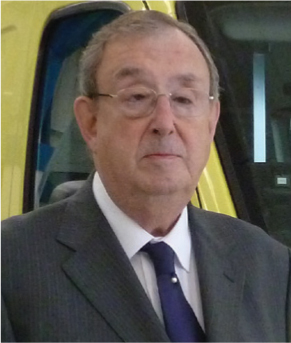
Professor Douglas Chamberlain, talking with the Journal of Paramedic Practice, sets the theme for his presentation of the inaugural Larrey Lecture at the Royal Society of Medicine in London on 13 July 2016.
The lecture marks the 250th anniversary of the birth of Dominique Larrey on 8 July 1876, and it is strangely coincidental that the lives of Dominique Larrey and Douglas Chamberlain bear some striking resemblance, particularly during their early days.
Larrey was born in the little Pyrénnées village of Beaudéan, the son of a shoemaker. He was orphaned at the age of 13 and raised by his uncle, a surgeon. Later he studied medicine in Paris, and at 26 he joined the army. During this time, Larrey won battles with military and political bureaucracy to initiate the modern method of army surgery, field hospitals, and ‘Flying Ambulances’ for rapid transport of the wounded from the battlefield.
With Napoleon's army at the Battle of Waterloo in 1815, his courage under fire was noticed by the Duke of Wellington, who ordered his soldiers not to fire in his direction in order to ‘give the brave man the time to gather up the wounded’ and saluted ‘the courage and devotion of an age that is no longer ours.’
Larrey died in 1842 and he is today acknowledged as the father of the modern day ambulance service.
Douglas Chamberlain was born in 1931 in Cardiff, the son of a coal merchant. He was not successful during his school years until a school master realised he was very intelligent but had an ‘inability to comprehend the written word.’ a condition now called dyslexia. He was given extra help and he passed the entrance exam to Queens' College, University of Cambridge to study medicine, qualifying as a doctor in 1956.
Like Larrey, Chamberlain had to overcome resistance from his superiors who frowned on his innovative concepts when he was at the Royal Sussex County Hospital between 1970 and 1991, and started to train ambulance personnel in resuscitation. This was a pivotal moment in the development of the paramedic profession as the naissance of paramedics in Europe and the period in which he developed his 10 Rules of a normal ECG, a foundation to ECG interpretation used all the world to this day.
The evening is being sponsored by Smartgate Solutions and the Society's nominated charity, The Ambulance Services Charity (TASC), will benefit from funds raised at the event.
Tickets for the lecture, including a Q&A session with Professor Chamberlain, a drinks reception and buffet supper and a souvenir brochure can be purchased online at www.larreylecture.co.uk at the following prices:
Professor Douglas Chamberlain, CBE, KSG, will be presenting at the Royal Society of Medicine in London the inaugural Larrey Lecture which celebrates the 250th anniversary of the birth of Dominique Jean Larrey.
‘I will be talking about the history of the ambulance service, where we are now with many problems, how I see things evolving but also how I think it should evolve,’ said Professor Chamberlain, the world famous British cardiologist, who founded the first paramedic unit in Europe in 1971 which revolutionised pre-hospital clinical care.

